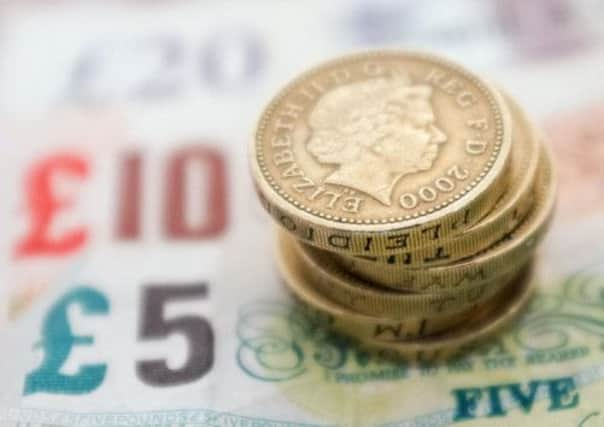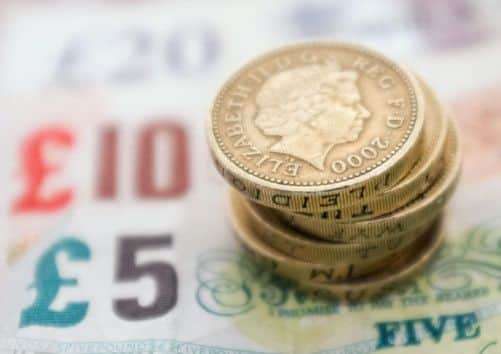Fuel prices spark bigger-than-expected inflation drop


The Office for National Statistics (ONS) said consumer prices index (CPI) inflation dipped to 2.4% in April, from 2.8% in March, as lower fuel costs and air fares pushed overall transport prices down for the first time in almost four years.
But the temporary dip in inflation triggered by weaker commodity prices will do little to ease the financial pain on households, with inflation expected to spike above 3% in the summer.
Advertisement
Hide AdAdvertisement
Hide AdThe pace of the fall surprised economists, who had expected CPI inflation to edge down to about 2.7% in April.


Howard Archer, economist at IHS Global Insight, said: “April’s marked drop in inflation to a seven-month low of 2.4% is very welcome news, providing significant relief for both consumers and the Bank of England.”
But Alan Clarke at Scotiabank said while it was a “big downward surprise”, much of the fall is likely to be temporary.
The Treasury said it was “good news for families and businesses”, adding the economy is “healing”.
Advertisement
Hide AdAdvertisement
Hide AdPlunging global commodity markets have hit the price of Brent crude oil in recent weeks, driving petrol and diesel costs lower.
Petrol prices fell by 2.1p over the month to 136.4p a litre compared with a 3.2p rise a year earlier. Diesel was 3.9p lower to 141.7p per litre, compared with a 2.1p rise a year ago.
Air fares fell by 6.4% on a month earlier, compared with a rise of 7.4% a year earlier.
The only notable upward effect came from food and non-alcoholic drinks. Prices rose by 0.7% on the month, compared with a 0.1% fall a year earlier, as farmers pushed through price rises after the freezing winter ruined crops.
Advertisement
Hide AdAdvertisement
Hide AdCPI inflation fell for the first time since last autumn, but is expected to provide only a temporary respite for households as rising gas, water and electricity bills feed through to households over the summer.
At 2.4%, it far outstrips wage rises which grew at just 0.4% in the first quarter versus a year earlier.
Inflation has remained stubbornly above the Bank of England’s 2% target since December 2009.
The Bank of England recently downgraded its inflation forecasts, predicting CPI inflation will peak at about 3.1% in the summer, instead of its previous forecasts of about 3.5%.
Advertisement
Hide AdAdvertisement
Hide AdEconomists said weaker-than-expected inflation will give the Bank more scope to resume economic stimulus through quantitative easing (QE).
The Bank held its asset purchase programme at £375 billion this month, and monetary policy committee (MPC) minutes published tomorrow may show outgoing governor Sir Mervyn King changed his mind over another £25 billion of QE as the economy makes a better-than-forecast recovery.
Sir Mervyn recently declared the recovery is in sight and upgraded UK growth prospects. He hands over to new governor Mark Carney in July.
Lower transport prices provided the biggest contribution to the fall in inflation, after the price of a barrel of crude oil fell by 6.8% on the month. Transport costs fell for the first time since July 2009, dropping 0.6% on the month, aided by lower prices for long-haul and European flights.
Advertisement
Hide AdAdvertisement
Hide AdJames Knightley, economist at ING Bank, said: “We may see headline inflation rise modestly again in the next couple of months as sharp falls in petrol prices last summer drop out of the annual comparison, but we agree with the Bank of England that the trend will be downwards thereafter.
“Moreover, with wage growth being so low at just 0.4% and inflation expectations remaining contained, there appears to be very little threat of a wage-price spiral in the UK.”
Today’s figures showed retail prices index (RPI) inflation, which includes housing costs, fell to 2.9% in April from 3.3% in March.
Recently launched experimental measures of inflation - CPIH, including housing costs, and RPIJ, which was created to iron out the gap formed by the different methods of calculating the price of goods, fell to 2.2% and 2.3% respectively in April.
Advertisement
Hide AdAdvertisement
Hide AdA Treasury spokesman said: “This is good news for families and businesses. Inflation is down by more than a half from its peak.
“The Government has taken consistent action to help with the cost of living. Fuel duty and council tax have been frozen and hundreds of pounds has gone back into people’s pockets through increases in the tax free personal allowance.
“As the governor of the Bank of England indicated last week, the economy is healing. The deficit is down by a third, more than a million and a quarter new private sector jobs have been created and interest rates remain near record lows.”